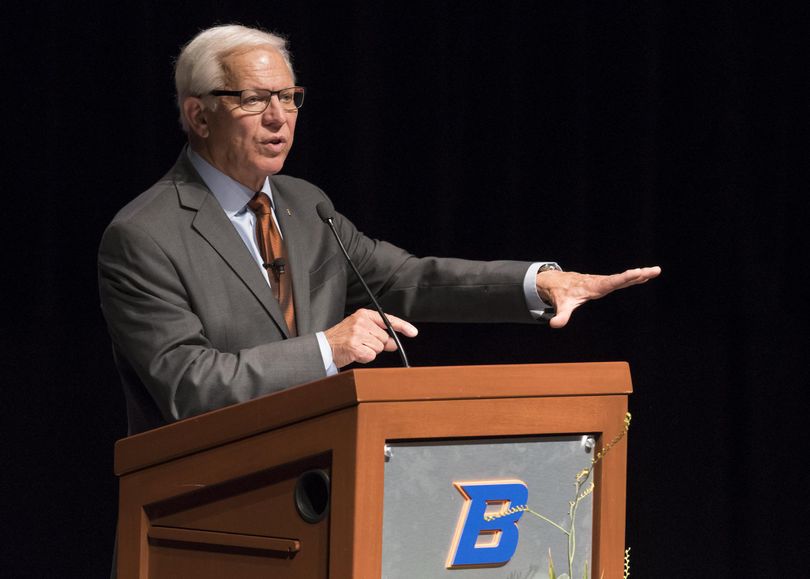BSU President Kustra not stepping down, despite Labrador’s call for resignation

Here's my full story from spokesman.com:
By Betsy Z. Russell
BOISE – Longtime Boise State University President Bob Kustra hasn’t announced any plans to step down in the wake of a call by 1st District GOP Rep. Raul Labrador for Kustra’s resignation, a university official confirmed Wednesday.
Labrador, in a radio interview, suggested Kustra should depart after the BSU president criticized Labrador’s response to the Charlottesville violence during Kustra’s annual “State of the University” address, which also included the announcement of the new Marilyn Shuler Human Rights Initiative on the Boise campus.
Labrador, who is running for governor, labeled Kustra “a 60-something white male from a liberal state trying to tell me, a young Hispanic male, how I should react to racism,” in an interview with 670 KBOI radio host Nate Shelman.
Kustra, 74, a native of St. Louis, Mo., has been president of BSU since 2003; earlier, he was president of Eastern Kentucky University, and before that, he served two terms as the Republican lieutenant governor of Illinois and 10 years in the Illinois Legislature in the 1980s and 1990s. He ran for the U.S. Senate as a Republican in 1996 but lost in the primary.
Labrador, 49, was asked by Shelman about Kustra’s comments, in which he said he was troubled by the responses of some public officials to the Charlottesville events, including Labrador and President Trump, whose efforts to address the issue Kustra dubbed “lame.”
“I’ve watched carefully as our public officials have commented on the events of last weekend, and it’s really sad to see some of the remarks,” Kustra said in his speech. “Congressman Labrador, for example, decided that he would come out against white nationalism, but he also came out against black nationalism. It’s like, let me Google that. When you Google black nationalism it takes you back to the 1960s and ‘70s, a movement that I won’t go into but the point is, it has nothing to do with what happened last weekend.”
Labrador said, “It’s interesting when you have a 60-something white male from a liberal state trying to tell me, a young Hispanic male, how I should react to racism. I thought it was very inappropriate what he did. Maybe it’s time for him to go, it’s time for him to decide that it should be somebody else’s turn to lead BSU. I think it was completely inappropriate.”
Labrador, who spoke at length, also said of Kustra, “Racial strife is more evident than ever in his own home town, in Illinois, in Chicago. So I don’t know what he has to lecture anybody about, but he shouldn’t be lecturing me about this. I love Idaho, I love the people of Idaho. And I think what some people were trying to do last week is to insinuate in some way that the people of Idaho are racist and that the people of Idaho have ill intent, and I will ask you, why is it that the people of Idaho continuously, overwhelmingly vote for a Hispanic congressman to go back to Washington, D.C. and represent them?”
He added, “I think it’s pretty shameful that anybody would try to lecture me on dealing with racism when I think I’ve dealt with it my whole life pretty well.”
That interview took place on Monday; on Tuesday, Labrador was again asked about Kustra in an interview on KIDO radio in Boise. “You know, I said what I said, I meant what I said, but I’m just, I’m gonna move on,” he said, “and I think it’s time for people like him and others to start thinking about do they want us to become like Illinois and Chicago or do they want to be the peaceful place that Idaho is, and I would choose Idaho over Illinois any day of the week.”
Kustra’s State of the University address – the transcript of which stretches for 24 pages – included announcing various university initiatives and expounding on student career paths and the value of a liberal arts education; it also touched on issues of freedom of speech, intolerance and human rights in light of Charlottesville.
“Our universities are drawn into this because we exist in a space that guarantees the free expression of ideas, but as we saw happened, violence sometimes follows closely behind,” Kustra said. “We have to be on guard here at Boise State, but we also have to be committed to fostering continued dialogue and education to combat ignorance and hatred. Unfortunately, Idaho has not been immune to these views in its borders, but we’ve been lucky enough, fortunate enough, to have great leadership in this state, and that leadership has really helped us navigate these issues in the past, and I think they can do so into the future.”
BSU’s Marilyn Shuler Human Rights Initiative, both honoring and funded by the late Idaho human rights leader, will launch this fall; it will eventually include an academic certificate in human rights issues and advocacy, as well as offering public events including one in October featuring Tony Stewart and Norm Gissel, co-founders of the Kootenai County Task Force on Human Relations.
Kustra had no response to Labrador’s statements; Greg Hahn, BSU associate vice president for communications, said, “We just don’t have any comment.”
